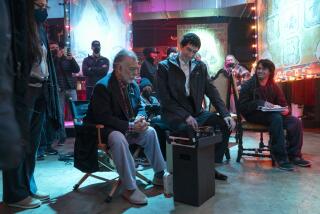Sony Gets Caught in a Second Ad Blunder
- Share via
Sony Pictures Entertainment announced Friday that it will no longer promote its movies using man-on-the-street testimonials after it was revealed that nationally televised spots for Mel Gibson’s Revolutionary War epic “The Patriot” last summer used two Sony employees in a montage of interviews praising the Columbia Pictures film.
Sony spokeswoman Susan Tick described the ad as an “isolated incident that occurred a year ago,” and noted that the studio has only used testimonials on two of its films during the past year: “The Patriot” and the January release of director Guy Ritchie’s crime thriller “Snatch.”
The action comes less than two weeks after the studio admitted its advertising department had invented a fake film critic named David Manning to hype four of Columbia’s films in newspaper ads. Sony launched an immediate inquiry and later handed down 30-day suspensions to the head of its advertising department and a junior creative advertising director in connection with that scandal.
“We’ve previously acknowledged that we are reviewing our advertising procedures [in relation to Manning], and our new policies will end the use of testimonial ads,” Tick said Friday, adding that there are no plans to investigate the “Patriot” ads further because they happened a year ago under a different marketing regime.
In the so-called “fake fan” incident, first reported in the Hollywood trade publication Daily Variety, Sony admitted that employees Tamaya Petteway and Anthony Jefferson, who still work in Columbia’s worldwide advertising department, were used to hype “The Patriot” in commercials that neglected to point out that the two were employees of Sony.
A spokeswoman for the Federal Trade Commission in Washington, D.C., which investigates deceptive practices affecting commerce, said the agency never comments on specific cases or companies. But referring to the news reports about Sony, she said, “Clearly the alleged conduct is troublesome.”
In the TV spots, Petteway looks into the camera and assures viewers the movie is a “perfect date movie” as her ostensible date, Jefferson, silently looks on with a faint smile, according to Variety.
Sony acknowledged that Petteway works as executive assistant to Dana Precious, Columbia’s senior vice president of creative advertising, who was in charge of marketing for the film, and that Jefferson works on the finance side.
In a statement given to Variety, Precious defended the “Patriot” spots.
“Using actors, real people or employees as spokespeople is not unique to the entertainment business, is not specific to Sony Pictures Entertainment and is not something that is practiced only by me,” Precious said. “That said, perhaps this is a time for all of us in the business of marketing to review the practices that have become an industry standard and to rethink and redraw some boundaries.”
But other marketing officials beg to differ.
“For her to say that everybody does is just not true,” said the marketing chief of a rival studio. “Everybody doesn’t do it. True, the testimonials are rigged. You do hope you have the right type of person. Some are actors. But nobody has ever used their own employees that I’ve ever heard of.”
Another marketing chief, who also asked not to be identified, said, “Audience reaction shots are common, but you do them with a real audience.”
The official added that testimonials are tried from “time to time” because it’s “kind of a fun idea” but noted it is difficult to find real people who are sufficiently enthusiastic or good enough on camera to use them in a commercial.
“They usually aren’t really that entertaining, smart, witty or funny to make good television,” the marketing chief said.
The latest incident comes at a bad time for Sony’s marketing officials, who are trying to recover from the negative publicity over David Manning. In newspaper ads, Sony’s ad department inserted Manning’s blurbs heaping accolades on four Sony films: “The Animal,” “A Knight’s Tale,” “Vertical Limit” and “Hollow Man.”
Last week, Sony suspended Josh Goldstine, senior vice president of creative advertising, and Matthew Cramer, a director of creative advertising, in connection with the Manning scandal. Cramer reportedly used the name of an old college pal at USC when he came up with the name David Manning.
Manning, who purportedly worked for a small newspaper in Connecticut called the Ridgefield Press, was quoted in Sony movie ads praising “The Animal” as “another winner!” and calling actor Heath Ledger, the young star of “A Knight’s Tale,” “this year’s hottest new star!”
The ruse was discovered when Newsweek magazine called the Ridgefield Press and learned that no such critic worked for the 7,500-circulation weekly.
More to Read
The biggest entertainment stories
Get our big stories about Hollywood, film, television, music, arts, culture and more right in your inbox as soon as they publish.
You may occasionally receive promotional content from the Los Angeles Times.










